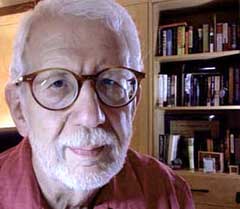Bob Meyers: How I Became an Oxfordian
November 20, 2015

When I was about 11 or 12, we read Julius Caesar in junior high. When I tried to find out about the author, I learned that he was a glover’s son who completed elementary school, went to London to write great plays, become rich, and went back to his rural home.
That was in contrast to all the kids’ bios of English writers I was reading for school in New York City — Spenser, Chaucer, Keats, Shelley, etc. It also contrasted with the bios of contemporary figures I was reading for fun at home — Dwight Eisenhower, Harry Truman, Mickey Mantle. All of them had some background in the things they did or became later in life: Ike was a farm boy smart enough to get into West Point, Truman “plowed the straightest furrow in the county,” his mother said (I’ve never forgotten that line), Mickey was tossing baseballs with his father from the age of three and learning to switch hit.
Shakespeare’s bio didn’t make any sense. I figured he wrote the plays, but we just didn’t know anything about him.
In high school I focused on drama and wanted to be a stage director. In college in Miami and Los Angeles I majored in English with a focus on Shakespeare and 16th and 17th century English lit. I graduated from UCLA in 1965 and that nagging feeling I had had in junior high stayed with me — who was this guy?
Somewhere I read that there was an authorship controversy. I read what I could about Bacon and Marlowe. For me, their known writings were no match to Shakespeare’s — either in tone or sensibility. It was like trying to fit the square peg in the round hole. Then, somehow, I read about Oxford — I wish I could remember where or when — and it made a lot of sense to me. The background, the knowledge, the familiarity with the still-closed Elizabethan society — could this be the guy?
Beginning in 1968, I joined or purchased material from the Shakespearean Authorship Society (U.K.) (SAS), the Shakespeare Oxford Society (U.S.) (SOS), the Shakespearean Authorship Review (U.K.), and others. In a used bookstore on Hollywood Boulevard, I found a 1949 copy of J. Thomas Looney’s “Shakespeare” Identified. In 1972 I went to London for the 50th anniversary of the SAS and in addition to talks we toured Castle Hedingham. On that trip I met the marvelous scholar and researcher Ruth Loyd Miller, who sent me copies of her invaluable publications. I read works by the Ogburns, Eva Turner Clark, and then, more recently, Mark Anderson’s essential “Shakespeare” by Another Name (2005). I read Richard Roe’s Shakespeare Guide to Italy, joined the SOS (now the SOF), read Roger Stritmatter’s groundbreaking and precise work on Shakespeare and the Geneva Bible, met the astoundingly well-read Richard Waugaman, and felt I was home.
Oxford’s the guy.
— Bob Meyers
“How I Became an Oxfordian” is a series edited by Bob Meyers. You may submit your essay on this topic (500 words or less in an editable format such as MS Word), along with a digital photo of yourself, to: communications@shakespeareoxfordfellowship.org. Also include a sentence about yourself, e.g.: “Jane Smith is a business owner in Dallas.” You must be an SOF member to submit an essay.
To join the SOF see our membership page. To read other essays in this series, click here.
Membership dues cover only a fraction of our budget, including all our research, preservation and programming. Please support the SOF by making a gift today!
Blue Boar Tavern: Wassail Q&A
Tuesday Dec. 17, 8pm E / 5pm P
Sign up below for event invites!
